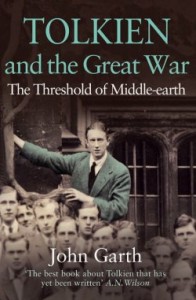 In this extract from his acclaimed book Tolkien and the Great War: the Threshold of Middle-earth, John Garth outlines some of the earliest antecedents of J.R.R. Tolkien’s Legendarium, in around March 1916, shortly before he left for the Somme. Even for someone who’s only read as far as, say, The Silmarillion, there are tantalising threads of familiar and semi-familiar names.
In this extract from his acclaimed book Tolkien and the Great War: the Threshold of Middle-earth, John Garth outlines some of the earliest antecedents of J.R.R. Tolkien’s Legendarium, in around March 1916, shortly before he left for the Somme. Even for someone who’s only read as far as, say, The Silmarillion, there are tantalising threads of familiar and semi-familiar names.
Tolkien’s earliest mythology of Middle-earth, 1915–1916
by John Garth
TOLKIEN’S Middle-earth did not spring fully-formed into what we see in The Hobbit, The Lord of the Rings and The Silmarillion. Its complex development is laid out in Christopher Tolkien’s History of Middle-earth, going back to The Book of Lost Tales begun in late 1916 in hospital after the Battle of the Somme.
But there is an even earlier phase of Tolkien’s work on Middle-earth: from 1915–16, glimpsed fragmentarily in poems and in a lexicon of Qenya, his first invented Elvish language.
Here, in a passage from Tolkien and the Great War, I tentatively piece together the way the mythology stood in about March 1916, shortly before embarkation for the Somme. For those interested, brief notes on how I did so may be found at the end. Some details (and spellings or diacritics) are quite familiar, many are not. Some details (and spellings or diacritics) are quite familiar, many are not. Beings and places which survive in the later legendarium appear here under earlier names: for example, Eru (God) is Enu, which Tolkien relates to a Qenya verb meaning ‘devise’. Some names eventually found an entirely different use: decades later, ‘Sangahyando’ was given to a rebel royal of Gondor in The Lord of the Rings. Some concepts, such as the Valar and Eldamar, were to undergo many further developments.


